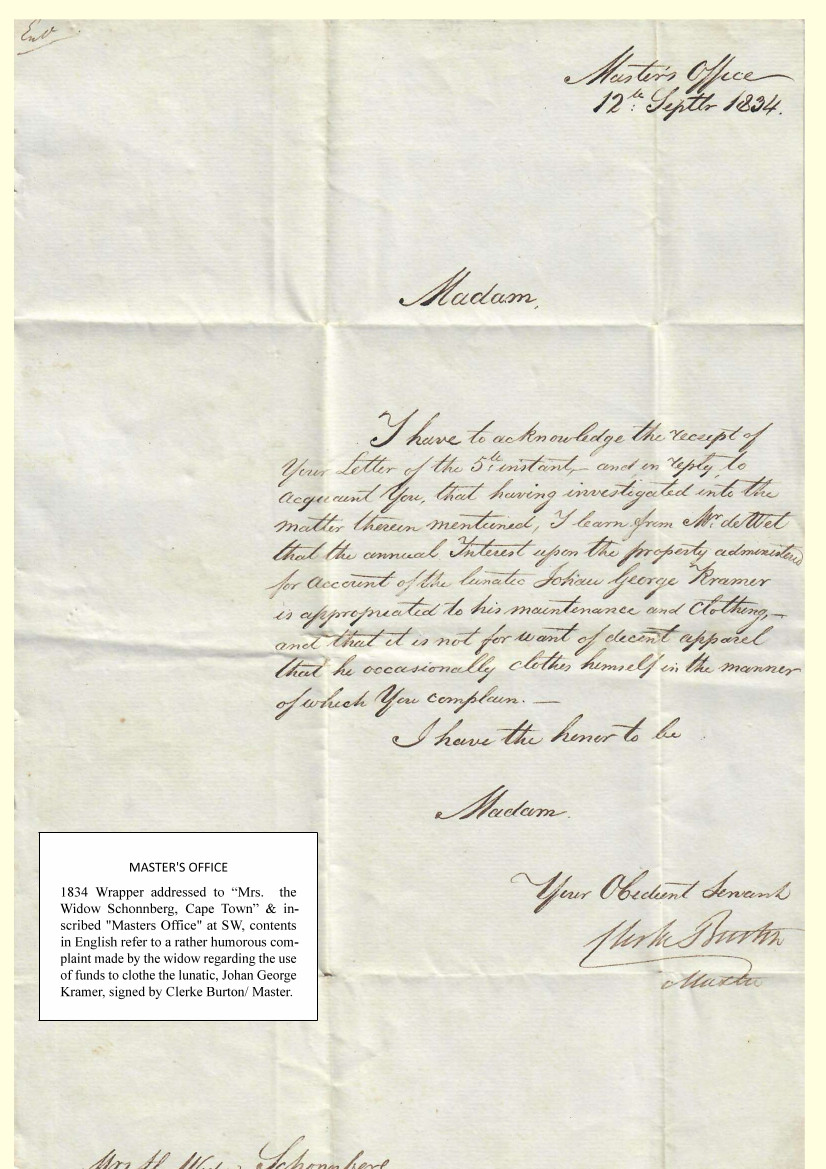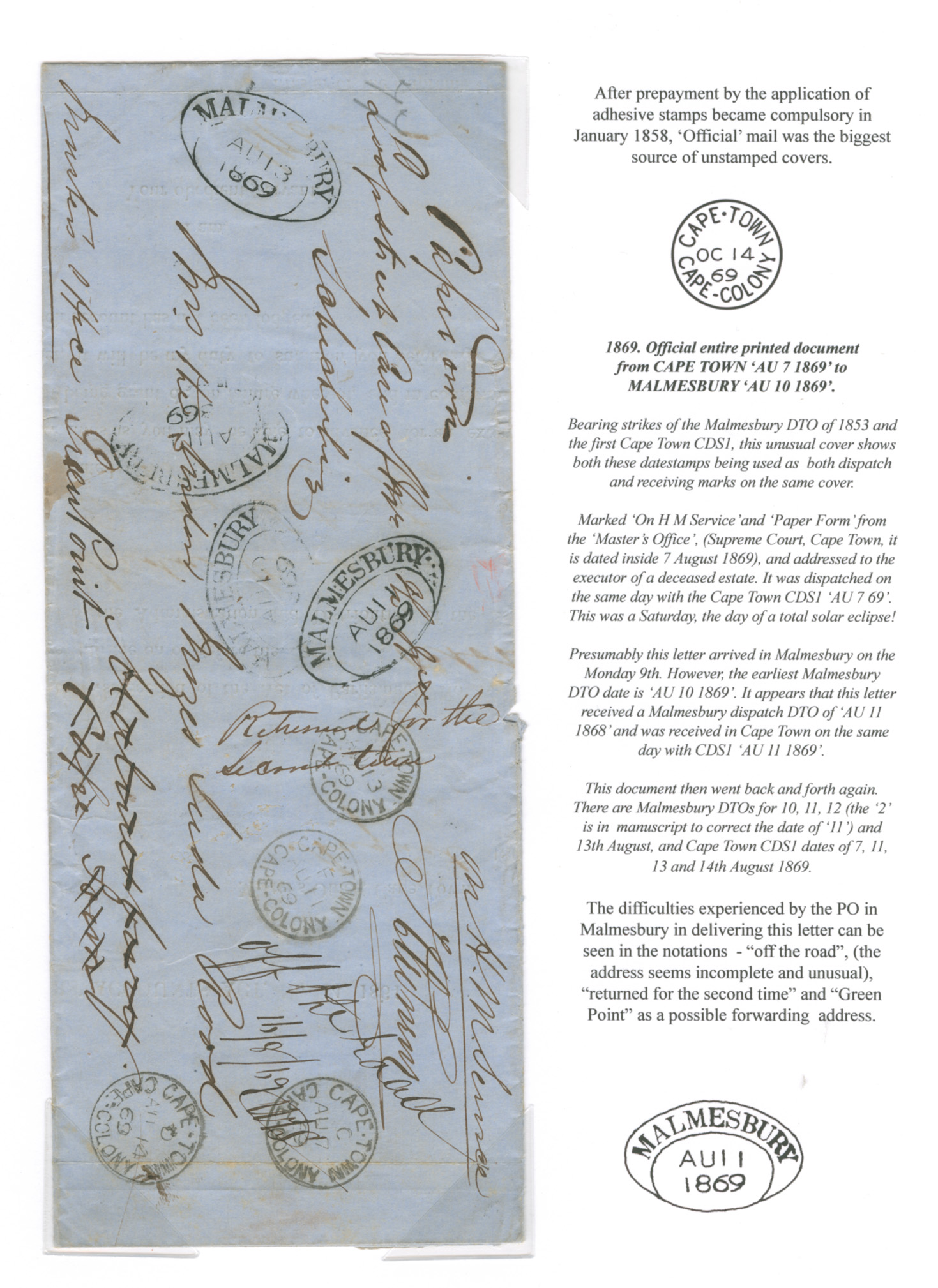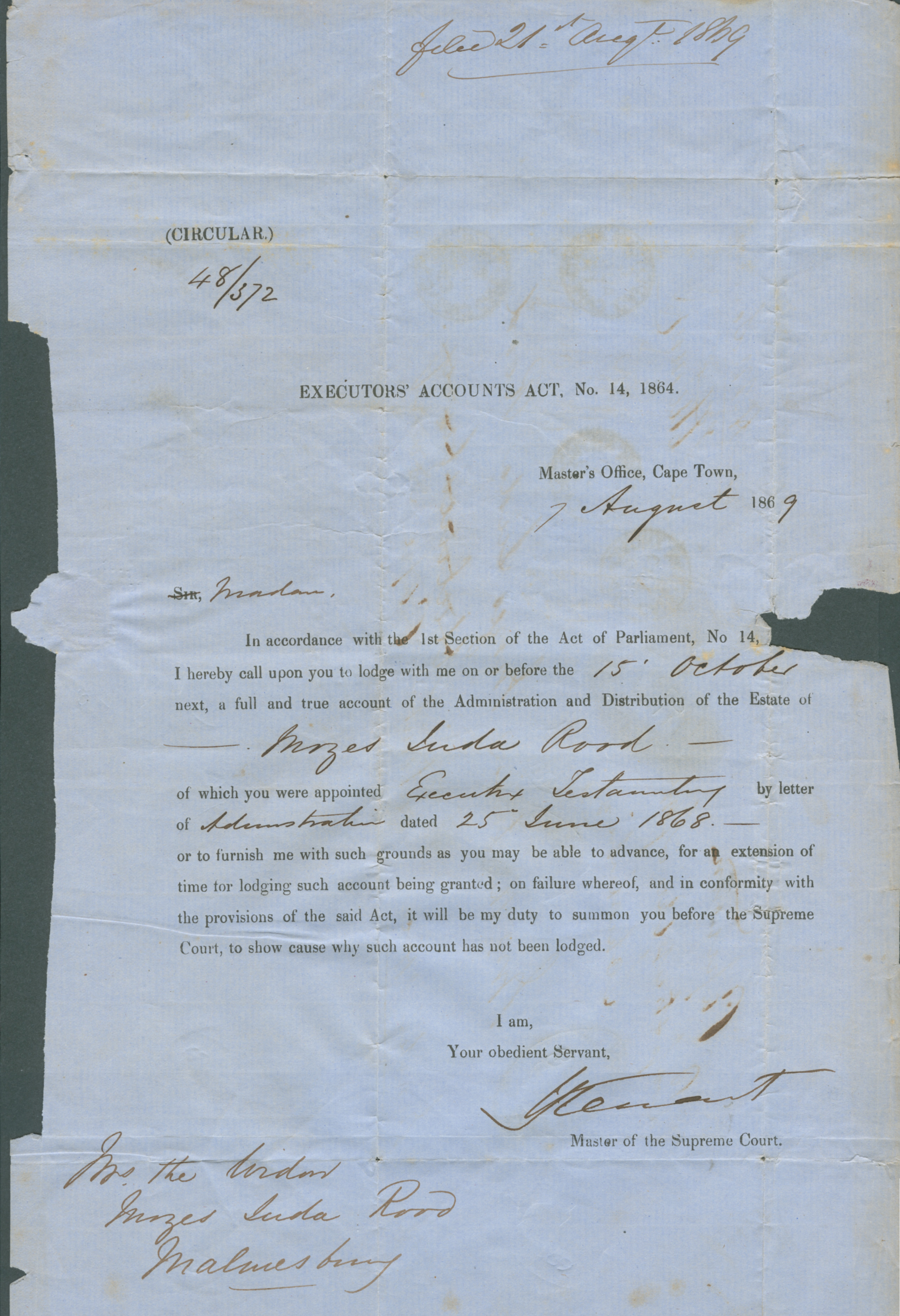Cape of Good Hope: Cape Characters
Quote from yannisl on October 9, 2020, 3:07 pmSouth African women would take nonsense from no-one. The attached letter is reply from Clerke Burton to a window who must have written to him complaining about the support paid to a "lunatic."
At the time Burton was holding a very high position, as well as being the Grand Master of the Masonic Lodge. He took care to respond in his own hand-writing.
If I had the skills of Jamie, I might have written a poem for her!
South African women would take nonsense from no-one. The attached letter is reply from Clerke Burton to a window who must have written to him complaining about the support paid to a "lunatic."
At the time Burton was holding a very high position, as well as being the Grand Master of the Masonic Lodge. He took care to respond in his own hand-writing.
If I had the skills of Jamie, I might have written a poem for her!
Uploaded files:Quote from Steve on October 11, 2020, 11:24 amThis lady appears to have disregarded the orders of the court. This letter is a pre-printed EXECUTOR'S ACCOUNTS ACT. No. 14, 1864, demanding that the recipient, the Executive Testamentary (?) lodge a "full and true account of the Administration and Distribution of the Estate of Mozes Suda Rood (?)". The lady to whom this letter is addressed, ("Dear Madam"), is not named because she was presumably the wife or daughter, perhaps, of the deceased of whose estate she was the executor. The letter is addressed to her in his name, it appears. It would appear that she was both negligible in dealing with the Master of the court and extremely determined in avoiding his communications. She clearly thought she could run and hide away somewhere. She must have been some desperate character.
This lady appears to have disregarded the orders of the court. This letter is a pre-printed EXECUTOR'S ACCOUNTS ACT. No. 14, 1864, demanding that the recipient, the Executive Testamentary (?) lodge a "full and true account of the Administration and Distribution of the Estate of Mozes Suda Rood (?)". The lady to whom this letter is addressed, ("Dear Madam"), is not named because she was presumably the wife or daughter, perhaps, of the deceased of whose estate she was the executor. The letter is addressed to her in his name, it appears. It would appear that she was both negligible in dealing with the Master of the court and extremely determined in avoiding his communications. She clearly thought she could run and hide away somewhere. She must have been some desperate character.
Uploaded files:Quote from yannisl on October 11, 2020, 1:40 pmSteve
This is an excellent example, as well as detective work. Can you please post the inside of the letter as well?
Steve
This is an excellent example, as well as detective work. Can you please post the inside of the letter as well?
Quote from Steve on October 11, 2020, 5:57 pmHere's the printed inside inside of the letter. I have cropped it a bit top and bottom. The years have not treated this court document kindly; on the plus side, the Cape Town and Malmesbury Post Offices have been generous in the attention paid to it! I am unsure of the name and the accuracy of my comments about this as described above.
Here's the printed inside inside of the letter. I have cropped it a bit top and bottom. The years have not treated this court document kindly; on the plus side, the Cape Town and Malmesbury Post Offices have been generous in the attention paid to it! I am unsure of the name and the accuracy of my comments about this as described above.
Uploaded files:Quote from yannisl on October 12, 2020, 1:36 pmSteve
Thanks for the extra scan. She was the widow alright. You can see this at the bottom left of the image. She was the appointed Executrix Testamentary which meant that she was to administer the Estate of her late husband. The Master was obviously in a hurry to close the Estate to collect the taxes... During the VOC period and and part of British the Orphan Chamber was in charge and things moved quicker (they had to list all assets within 48 hours or less to protect them from being pilfered). Also Inheritance Laws were based on different principles with normally the wife getting 50% and the children the balance. One could not disinherit the children in his will, that resulted in farms being broken up. The effect of this was that it was not possible to end up with large plantations in South Africa like in other areas and the largest holding of slaves even in the largest farms was less than 30.
Nice piece of postal history
Steve
Thanks for the extra scan. She was the widow alright. You can see this at the bottom left of the image. She was the appointed Executrix Testamentary which meant that she was to administer the Estate of her late husband. The Master was obviously in a hurry to close the Estate to collect the taxes... During the VOC period and and part of British the Orphan Chamber was in charge and things moved quicker (they had to list all assets within 48 hours or less to protect them from being pilfered). Also Inheritance Laws were based on different principles with normally the wife getting 50% and the children the balance. One could not disinherit the children in his will, that resulted in farms being broken up. The effect of this was that it was not possible to end up with large plantations in South Africa like in other areas and the largest holding of slaves even in the largest farms was less than 30.
Nice piece of postal history



